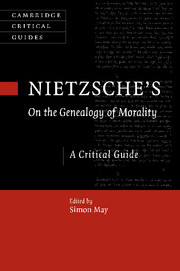Book contents
- Frontmatter
- Contents
- Contributors
- Acknowledgements
- Note on texts, translations, and references
- Introduction
- Chapter 1 The future of evil
- Chapter 2 On the nobility of Nietzsche’s priests
- Chapter 3 The genealogy of guilt
- Chapter 4 Why Nietzsche is still in the morality game
- Chapter 5 Who is the “sovereign individual”? Nietzsche on freedom
- Chapter 6 Ressentiment and morality
- Chapter 7 The role of life in the Genealogy
- Chapter 8 The relevance of history for moral philosophy
- Chapter 9 Why would master morality surrender its power?
- Chapter 10 “Genealogy” and the Genealogy
- Chapter 11 The promising animal
- Chapter 12 Nietzsche and the “aesthetics of character”
- Chapter 13 Nietzsche and the virtues of mature egoism
- Chapter 14 Une promesse de bonheur? Beauty in the Genealogy
- Bibliography
- Index
Chapter 11 - The promising animal
the art of reading On the Genealogy of Morality as testimony
Published online by Cambridge University Press: 05 November 2011
- Frontmatter
- Contents
- Contributors
- Acknowledgements
- Note on texts, translations, and references
- Introduction
- Chapter 1 The future of evil
- Chapter 2 On the nobility of Nietzsche’s priests
- Chapter 3 The genealogy of guilt
- Chapter 4 Why Nietzsche is still in the morality game
- Chapter 5 Who is the “sovereign individual”? Nietzsche on freedom
- Chapter 6 Ressentiment and morality
- Chapter 7 The role of life in the Genealogy
- Chapter 8 The relevance of history for moral philosophy
- Chapter 9 Why would master morality surrender its power?
- Chapter 10 “Genealogy” and the Genealogy
- Chapter 11 The promising animal
- Chapter 12 Nietzsche and the “aesthetics of character”
- Chapter 13 Nietzsche and the virtues of mature egoism
- Chapter 14 Une promesse de bonheur? Beauty in the Genealogy
- Bibliography
- Index
Summary
Getting underway
We are unknown to ourselves, we knowers, we ourselves, to ourselves, and there is a good reason for this. We have never looked for ourselves – so how are we ever supposed to find ourselves? How right is the saying: “Where your treasure is, there will your heart be also”; our treasure is where the hives of our knowledge are. As born winged-insects and intellectual honey-gatherers we are constantly underway towards them, concerned at heart with only one thing – to “bring something home” . . .
We remain necessarily strangers to ourselves, we do not understand ourselves, we must confusedly mistake who we are, the motto “everyone is furthest from himself” applies to us forever – we are not “knowers” when it comes to ourselves . . .
(GM, Preface, 1)Why are we knowers not only unknown to ourselves (as Nietzsche begins by claiming) but necessarily so self-estranged (as he finds himself insisting by the end of this opening section of his preface)? Why must we be confused or mistaken over who we are? If the problem were just that we have never hitherto looked for ourselves, then it would be easily solved: we could simply start looking, and thereby overcome our ignorance of ourselves. But how would born intellectual honey-gatherers go about such a task? They would think of it – as they think of all knowledge – as something that is to be gathered or collected, something to be brought home. But then seeking to know ourselves would require us to regard ourselves as essentially capable of being brought home, hence as presently (and perhaps forever) not-at-home to ourselves; to gather knowledge of ourselves, we must first be willing to conceive of ourselves as necessarily self-estranged or self-distanced.
So if Nietzsche thinks that we knowers are condemned to misunderstand ourselves, that must be because he thinks we are condemned to resist any understanding of ourselves as in need of gathering or collection, hence as dispersed or disseminated or internally differentiated, call it non-self-identical. What makes it impossible for us to achieve self-knowledge is thus the depth of our commitment to a conception of ourselves as always already at-home to ourselves – as self-identical, hence essentially transparent to ourselves (both from moment to moment – no sooner thinking something than knowing that we do – and with respect to our essence, which is of course thinking). We are essentially unknown to ourselves because we persist in regarding ourselves as essentially known; we will never look for ourselves because we think we have always already found ourselves, and have done so without ever really having to look. For when all is said and done, what there is to know about ourselves – the full depth and extent of our nature – is that we are knowers, essentially cognitive creatures, born collectors.
- Type
- Chapter
- Information
- Nietzsche's On the Genealogy of MoralityA Critical Guide, pp. 234 - 264Publisher: Cambridge University PressPrint publication year: 2011
- 2
- Cited by



